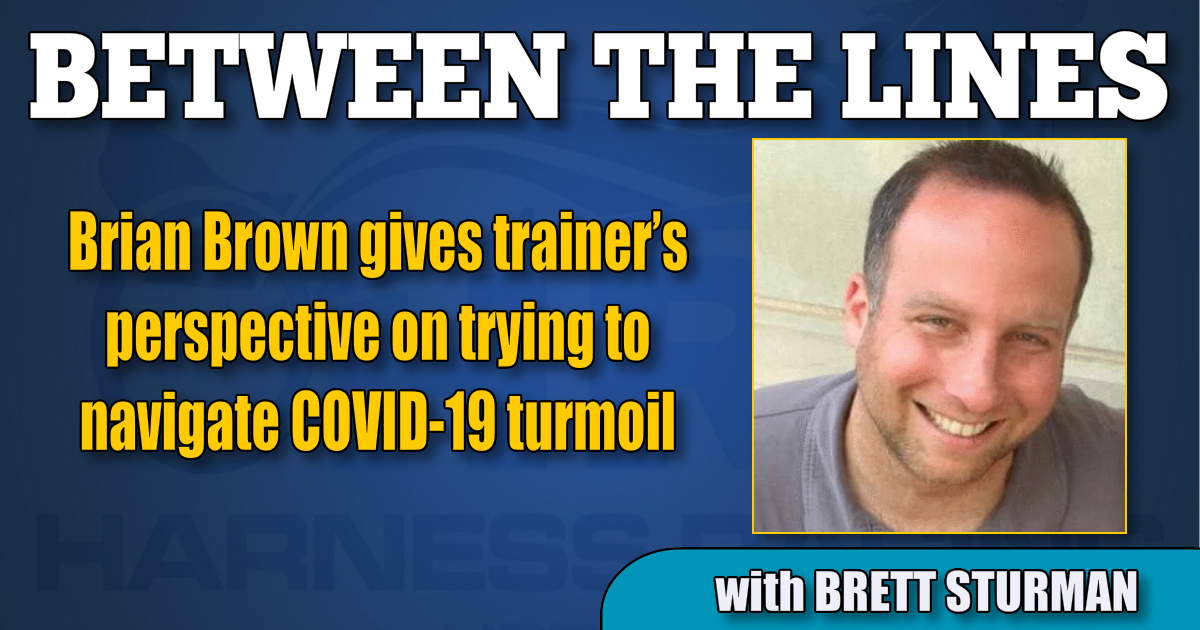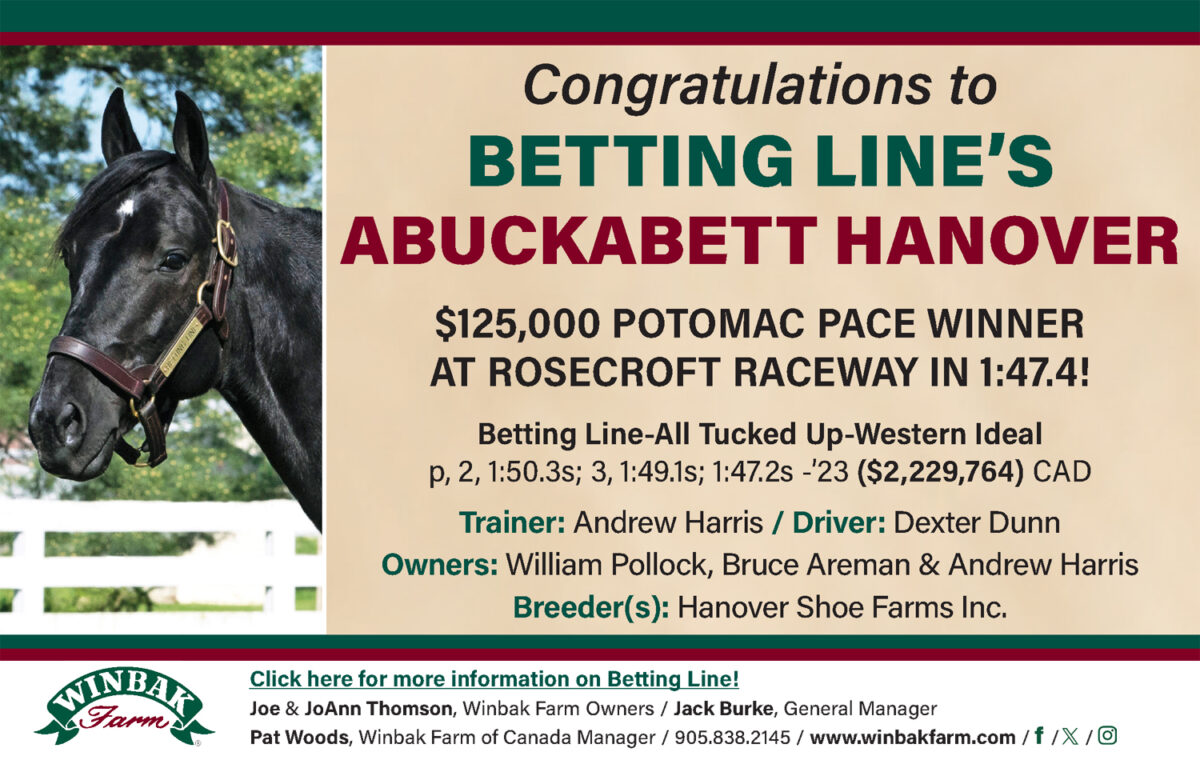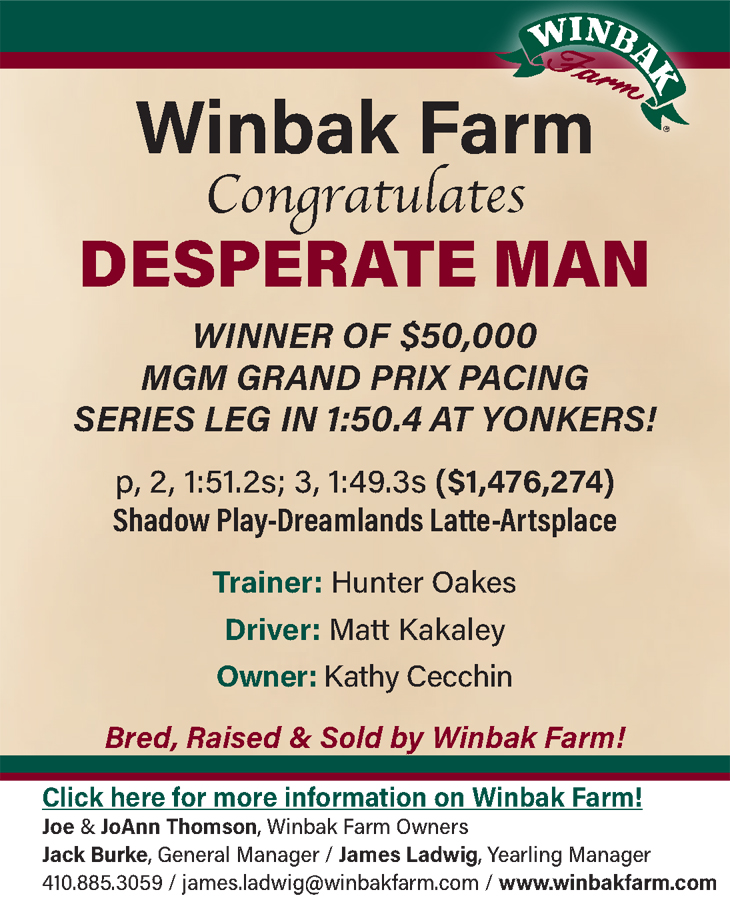Brian Brown gives trainer’s perspective on trying to navigate COVID-19 turmoil
He also weighs in on whether April 15 stakes payments should be deferred, or not.
by Brett Sturman
Like practically every other industry in the civilized world, harness racing has been brought to nearly a total halt. But while racing has ceased everywhere with the exception, for the time being, of Cal Expo, time continues on. Horses still need to be trained, help needs to be maintained, and bills still need to be paid. In addition to owners not having a source of income from their horses, trainers must adapt and condition horses through an indefinite period of time before knowing when they can actually race.
As 2017’s Dan Patch Trainer of the Year Brian Brown said, training horses without any idea of a specific date to prime them for presents challenges.
“It has affected my 3-year-olds’ schedule. I actually qualified 11 last Thursday (at Spring Garden Ranch in Florida) that were supposed to qualify today (Thursday) and would have be ready to go as soon as I got back to Ohio. Well now with everything shut down, I trained them and backed off,” Brown said.
“I only trained them an easy trip in 2:15 earlier in the week, trained them back two trips today in 2:10, but didn’t train them real hard. I’m going to try to follow that schedule, maybe even only go around 2:15 twice, until I hear something different.”
For Brown, the timing of having some horses ready is more of a priority than others. “The stakes horses, you’ve got a certain time they need to be ready by,” said Brown. “Overnight horses, even if they’re not ready when they say you can go back to racing, you can race later in the year or through the winter if you normally don’t. But stakes horses, there comes a time when they need to be ready and you need to be ready.
“The most positive thing to me would be if we could be racing May 1 in Ohio; I would feel fortunate. I’d like to race next week if I could, but I don’t see that happening. Nobody knows how this is going to work out. So, we’re just trying to keep them, train them light. If we get maybe a couple weeks’ notice of when we’ll be back up, I can have mine trained up, sharpened right back up. But you know, there is such a thing as overtraining too. You’ve got to be careful that we don’t train them into the ground. It’s as much attitude, horses will get tired of just training all of the time. We have to be careful we don’t do that and ruin attitudes as much as having horses getting sore.”
In readying his barn of 2 and 3-year-olds for the coming stakes season, there was some controversy made Thursday when the Hambletonian Society announced their decision to not defer stakes payments scheduled for April 15, despite the current global economic calamity. This decision was somewhat amplified considering that just the day prior Woodbine announced that they would in fact be suspending the April 15 standardbred stakes payments.
While I think it’s safe to say the reaction from most was negative to the Hambletonian Society’s decision, Brown had a somewhat different take.
“Last month (February) was the hard month. I own horses and I’ve got to pay too. Last month was when all these 2-year-old payments are due at the same time as the 3-year-olds, and the ones you like, you stake a little higher. Our Ohio races were all due last month and we have no payments due now, so last month was a tough month.”
On the issue of deferring the April 15 date, “To me, it’s a double-edged sword,” said Brown. “It would be nice if we didn’t have to make those payments this month coming up and to be able to make sure you hold onto your money if this drags on for several months. But, say we defer the payments back to May. In July already we’re going to go to racing, so what does that do to the purse? Right now for example, I’m keeping my 2YO’s on schedule hoping that we qualify in June like normal. If I keep going and we don’t have to make any payments until May or June even, I’m going to know the ones that I shouldn’t be paying. There’s no guarantee that I’m going to know which ones that are really good enough, but I’m going to know who the bad ones are going to be by June. And all of us are going to know by June that we shouldn’t pay certain horses that could be doing good now that you’re willing to stake. So, what does that do to the purse by race time? Are we going to have enough people paying to keep the purses up that’ll be really worthwhile racing for?”
For most harness tracks, it’s been about one to two weeks since racing has been suspended. In the extreme short-term, industry participants may be able to make ends meet but at some point a critical mass will be reached. How much longer can the entire industry business model be sustained during an economic shutdown.
“It all goes by my owners,” Brown said. “If they’re willing to keep paying us to train and we can keep waiting, I’m going to be fine and my help is going to be fine. But if we’re not going to race for several months and my owners say that we’ve got to stop this and turn these horses out and wait until they tell us they’re going to get ready to go, then we’re all going to be in trouble. Everything is up in the air. Nobody knows anything, so there’s no real way to plan for any of this.”
In the meanwhile, Brown and everyone else continue going forward on a day by day basis, planning the best they can without knowing when normal resumes.
















